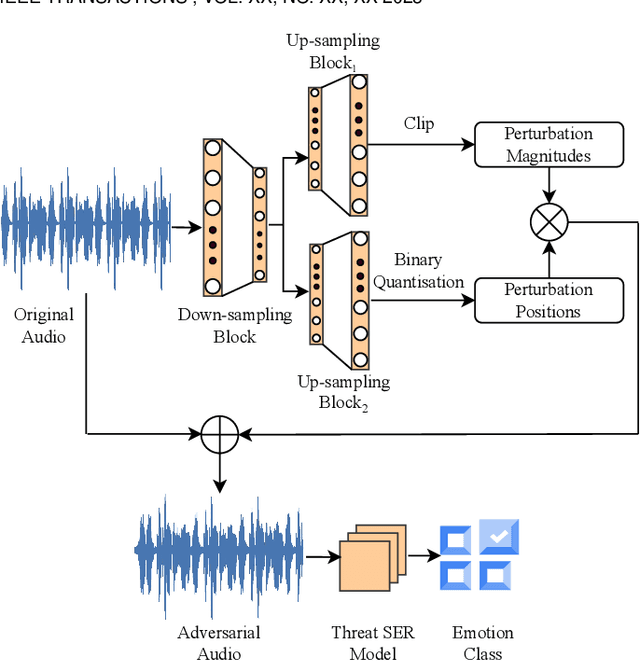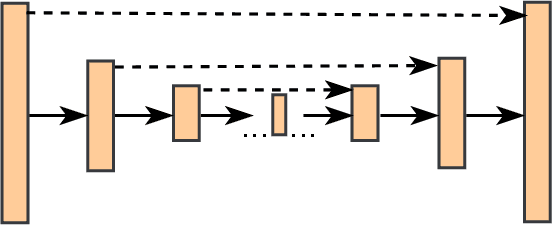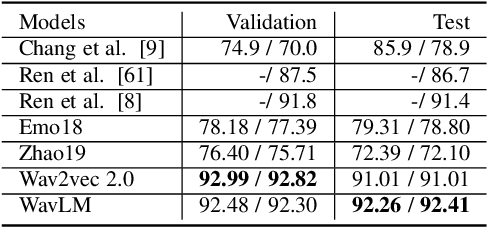Xi Shao
Leveraging Self-supervised Audio Representations for Data-Efficient Acoustic Scene Classification
Aug 27, 2024Abstract:Acoustic scene classification (ASC) predominantly relies on supervised approaches. However, acquiring labeled data for training ASC models is often costly and time-consuming. Recently, self-supervised learning (SSL) has emerged as a powerful method for extracting features from unlabeled audio data, benefiting many downstream audio tasks. This paper proposes a data-efficient and low-complexity ASC system by leveraging self-supervised audio representations extracted from general-purpose audio datasets. We introduce BEATs, an audio SSL pre-trained model, to extract the general representations from AudioSet. Through extensive experiments, it has been demonstrated that the self-supervised audio representations can help to achieve high ASC accuracy with limited labeled fine-tuning data. Furthermore, we find that ensembling the SSL models fine-tuned with different strategies contributes to a further performance improvement. To meet low-complexity requirements, we use knowledge distillation to transfer the self-supervised knowledge from large teacher models to an efficient student model. The experimental results suggest that the self-supervised teachers effectively improve the classification accuracy of the student model. Our best-performing system obtains an average accuracy of 56.7%.
STAA-Net: A Sparse and Transferable Adversarial Attack for Speech Emotion Recognition
Feb 02, 2024



Abstract:Speech contains rich information on the emotions of humans, and Speech Emotion Recognition (SER) has been an important topic in the area of human-computer interaction. The robustness of SER models is crucial, particularly in privacy-sensitive and reliability-demanding domains like private healthcare. Recently, the vulnerability of deep neural networks in the audio domain to adversarial attacks has become a popular area of research. However, prior works on adversarial attacks in the audio domain primarily rely on iterative gradient-based techniques, which are time-consuming and prone to overfitting the specific threat model. Furthermore, the exploration of sparse perturbations, which have the potential for better stealthiness, remains limited in the audio domain. To address these challenges, we propose a generator-based attack method to generate sparse and transferable adversarial examples to deceive SER models in an end-to-end and efficient manner. We evaluate our method on two widely-used SER datasets, Database of Elicited Mood in Speech (DEMoS) and Interactive Emotional dyadic MOtion CAPture (IEMOCAP), and demonstrate its ability to generate successful sparse adversarial examples in an efficient manner. Moreover, our generated adversarial examples exhibit model-agnostic transferability, enabling effective adversarial attacks on advanced victim models.
An Encoder-Decoder Based Audio Captioning System With Transfer and Reinforcement Learning
Aug 05, 2021



Abstract:Automated audio captioning aims to use natural language to describe the content of audio data. This paper presents an audio captioning system with an encoder-decoder architecture, where the decoder predicts words based on audio features extracted by the encoder. To improve the proposed system, transfer learning from either an upstream audio-related task or a large in-domain dataset is introduced to mitigate the problem induced by data scarcity. Besides, evaluation metrics are incorporated into the optimization of the model with reinforcement learning, which helps address the problem of ``exposure bias'' induced by ``teacher forcing'' training strategy and the mismatch between the evaluation metrics and the loss function. The resulting system was ranked 3rd in DCASE 2021 Task 6. Ablation studies are carried out to investigate how much each element in the proposed system can contribute to final performance. The results show that the proposed techniques significantly improve the scores of the evaluation metrics, however, reinforcement learning may impact adversely on the quality of the generated captions.
 Add to Chrome
Add to Chrome Add to Firefox
Add to Firefox Add to Edge
Add to Edge